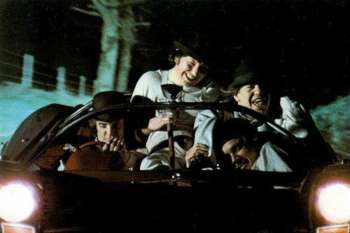Anthony Burgess’ novel A Clockwork Orange (and the Stanley Kubrick film based upon it) made a bold statement about what our technology should and shouldn’t do. Forcing citizens to obey the law is immoral, asserts Burgess. Once you’ve taken away our freedom of choice, you’ve taken away our souls.
But technology isn’t always about giving us more freedom to do things we couldn’t do before. Our lives are stuffed to the gills with choice, and there’s such a thing as too much of it. Sometimes technology can help precisely by taking away our freedoms. Small, inconvenient, and irritating freedoms.
 For instance: speed limits.
For instance: speed limits.
Most of us have precisely two feelings about speed limits. One, they’re too low; and two, it’s annoying to have to pay attention to them. Oh, we recognize in the back of our minds that speed limits are necessary, that speed limits act as a reminder and a deterrent and in the long run save lives.
But it’s difficult and irritating to pay attention to them. The signs are standardized across the nation so they’re easily recognizable, but you’re never quite sure when you’re going to see one. When you travel to another state, you never know what the interstate speed limit is. As a result, most of the speeding tickets we get — most of the ones I’ve gotten at least — are a result of ignorance, not disobedience. We want to obey the law, we really do. It’s just not easy enough.
So here’s a perfect opportunity to use the power of information technology to put our insignificant freedoms on pause.
What if the Department of Transportation created a national database of speed limit information tied to GPS coordinates? And what if every car was equipped with a specialized GPS unit that could tap into this database and therefore tell you what the proper speed limit was at all times?
Your car would then be able to sense when you were approaching or breaking the speed limit. Perhaps the dashboard could signal you with a flashing light or an audible chime. Or maybe, like videogame controllers, the car could give “force feedback” to make pressing the accelerator noticably more difficult the faster you’re going. Perhaps ultimately you might choose for the car to simply not let you exceed the speed limit — or to cap you at ten miles an hour over.
The first objection you’re going to raise is that we’d start seeing a new breed of Road Warrior out there hacking cars and telling you the speed limit is 55 in a 25 zone. (William Gibson’s novel Virtual Light begins with a scene of this kind of automotive hacking.) So security would obviously be paramount. I’m willing to bet that we could come up with a relatively hack-proof method of securing car GPS units and speed limit transmissions.
Then, of course, the question arises of what happens when you’re driving through a tunnel or a hurricane and the GPS information isn’t available. Well, there’s a simple solution for that: store a cached copy of the speed limit database locally in the car. (If that’s not a practical solution because of storage limitations, then certainly the car should be able to hold speed limit information within, say, a 200-mile radius.)
And what if the system breaks down altogether? Big deal. It’s not controlling anything. You could still drive as usual.
I think most of the objections you’re going to find to a concept like this don’t have anything to do with the safety aspects; people will simply object to the perceived lack of freedom. It’s only one step from there to having the police automatically issue you a ticket when you’ve broken the speed limit.
Which is why it’s essential that this kind of device be strictly voluntary. Nobody would be forced to obey the law. You’d simply be advised of it. The ultimate choice of whether to obey is up to you. If the Automated Speed Limiter was irritating you, you could always dial it back to a less restrictive setting that just alerts you to, say, speed limit infractions in low-speed areas more likely to be residential neighborhoods. Or you could just flip the sucker off entirely.
I’m betting that people would ultimately flock to a system like this, simply because the speed limit is such a pain in the ass. I’m willing to bet that most people would voluntarily sacrifice that extra five to ten miles an hour just for the added comfort of knowing that they’d never get a speeding ticket. Not to mention that good-citizen feeling of knowing that you’re contributing to saving lives.
Law enforcement would heartily endorse such a system (if it were proven effective) because it would drastically reduce the number of speeders. It might eventually allow cops to focus their efforts on more important matters.
Perhaps the best thing that could result from such a scenario is that local governments would raise speed limits to realistic levels, so we would never have to sit on a wide-open highway at 55 mph again.
(A quick Google before I published this article reveals that a UK government agency called Transport for London is already planning such a system. See this coverage on News.com. See what a prophet I am? Unfortunately, it appears that their system is an all-or-nothing affair: Exceed the speed limit, and the car automatically slows down. A recipe for complaints about Big Brotherism, as per above.)